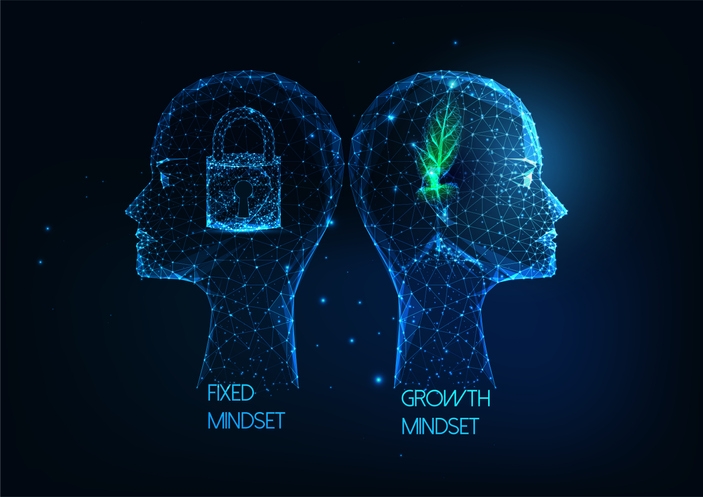Developing a Growth Mindset

The Role of Mindset
When coaching and developing your team, it’s essential to operate with a growth mindset instead of a fixed mindset. Understanding of personal and team ability (both now and in the future) is heavily influenced by mindsets, or beliefs, about whether a person’s abilities are fixed or whether they can be developed.
A “fixed mindset” refers to people who view their skills and talents as qualities they either possess or lack. People with a “growth mindset,” in contrast, enjoy challenges, strive to learn, and consistently see potential to develop their skills and talents.
Try these tips to develop a growth mindset:
- Self-Reflect. Take time to acknowledge and reflect upon your leadership. Recognize your strengths and weaknesses. Don’t look away from your failures. Embrace them. Learn from them.
- Trust yourself. Stop seeking approval from others. Develop your own self-acceptance and self-approval. It’s important that you trust and believe in yourself.
- Embrace positivity. Replacing negative thoughts with positive ones will help build a growth mindset. When feelings of negativity arise, find replacements such as acceptance, compassion and gratitude.
- Set goals. Create clear, realistic goals to develop your skills based on your passion and purpose. It takes time to learn a new skill, so be sure to give yourself enough time to accomplish the goals you have set.
- Take on challenges. Part of developing a growth mindset is shattering the negative perception of a challenge. Embrace challenges and view them as learning experiences. Change your perspective to think about a challenge as an opportunity.
- Value criticism. Criticism can be valuable because it allows you to see what you are doing from a different perspective than your own. Opening yourself up to suggestions and constructive criticism can help you develop a growth mindset.
Additional Exercises
Reflect on the following questions:
- Why is believing in and modeling a “growth mindset” critical to your success?
- How might operating with a “fixed mindset” limit your abilities to succeed in your role?
- “Employees in a ‘growth mindset’ company are 47% likelier to say that their colleagues are trustworthy.” Based on your learnings from the articles and videos linked below, why might this be the case?
- How might operating with a “fixed mindset” inadvertently erode trust on your team?
Take the following Growth Mindset Self-Assessment. Read each of the statements and consider whether you strongly agree, agree, are neutral, disagree, or strongly disagree with each one.
- “We value passion, dedication, growth, and learning, not genius.”
- “We don’t expect that you’ve arrived here fully formed.”
- “We care more that you’re ready to learn.”
- “We expect that you’ll stretch beyond your comfort zone and take reasonable risks.”
- “We value process and we reward process – taking on big but reasonable challenges.”
- “We reward tenacity and grit.”
- “We reward teamwork.”
If you answered, “agree” or “strongly agree” to most questions, that means you are operating with a growth mindset. If not, you may wish to spend more time cultivating a growth mindset.
Further learning:
- Read: ”Mindset: The New Psychology of Success” by Carol Dweck
- Watch: ”Growth Mindset vs. Fixed Mindset”
- Watch: ”The Power of Belief — Mindset and Success”
- Read: “How Companies Can Profit from a Growth Mindset”
- Read: ”How Microsoft Builds a Sense of Community Amongst 144,000 Employees”
- Read: Satya Nadella at Microsoft: “Instilling a Growth Mindset”